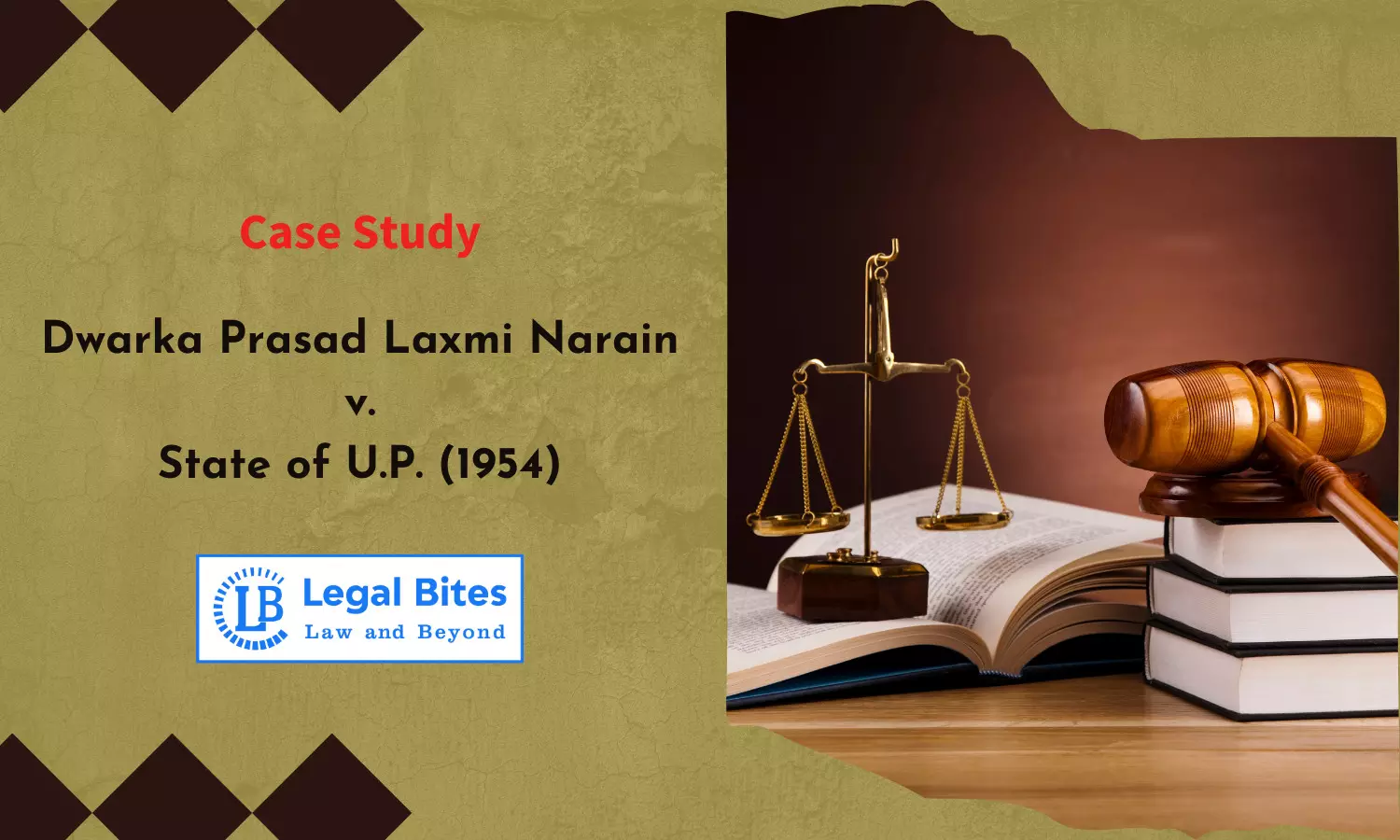Case Study: Dwarka Prasad Laxmi Narain v. State of U.P. | Administrative Discretion
This case law declared clause 4(3) of the Uttar Pradesh Coal Control Order void due to its imposition of an unreasonable restriction on the freedom of trade.

This case law declared clause 4(3) of the Uttar Pradesh Coal Control Order, 1953 void due to its imposition of an unreasonable restriction on the freedom of trade and profession guaranteed under Article 19(1)(g) of the Constitution.Case Title: Dwarka Prasad Laxmi Narain v. State of U.P.Court: Supreme Court of IndiaCitation: 1954 AIR 224; 1954 SCR 803Judge: Justice M.C. Mahajan (C.J.); Justice B. Jagannadhadas; Justice B.K. Mukherjea; Justice Ghulam Hasan; Justice Vivian BoseDate of...
This case law declared clause 4(3) of the Uttar Pradesh Coal Control Order, 1953 void due to its imposition of an unreasonable restriction on the freedom of trade and profession guaranteed under Article 19(1)(g) of the Constitution.
Case Title: Dwarka Prasad Laxmi Narain v. State of U.P.
Court: Supreme Court of India
Citation: 1954 AIR 224; 1954 SCR 803
Judge: Justice M.C. Mahajan (C.J.); Justice B. Jagannadhadas; Justice B.K. Mukherjea; Justice Ghulam Hasan; Justice Vivian Bose
Date of Judgment: 11/01/1954
Facts
The Petitioners were involved in the business of selling coal in the city of Kanpur. District magistrate and District supply officer were the respondents who through consecutive executive orders interfered with the petitioner’s business. One such restrictive executive order was released on February 14th, 1953. The order fixed the coal price at a rate at which petitioners were not able to continue with the coal business.
The petitioners challenged the order in the local court. The judge stayed the order as it had no legislative backing. Thereafter, the Uttar Pradesh Control Order, 1953 was passed which provided justification and backing to the executive order released on the 14th of February. Another order was passed on the 16th of July 1953 which fixated the coal price. Due to the various irregularities being committed by the petitioners, the district magistrate cancelled the license of the petitioners to conduct the trade of coal. This resulted in the petitioners filing a writ of mandamus under Article 32 of the Constitution for violating Article 14 and Article 19(1)(g) of the Constitution.
Issues
- Whether the act of the district magistrate cancelling the petitioner’s license was valid?
- Whether the Uttar Pradesh Coal Control Order 1953 was constitutionally valid?
Laws Applied
The laws that are applied in this case are Article 14 which deals with the right to equality, Article 19(1)(g) which emphasizes the right to freedom of trade and profession and lastly the Uttar Pradesh Coal Control Order.
Arguments by the Petitioner
Firstly, the counsel for the petitioners argued that the Uttar Pradesh Coal Control Order, 1953 issued unrestrictive powers and discretion for granting a license. They pointed out that the powers cannot only be used by the licensing authority or the State Coal Controller but also by any person to whom such power is delegated by the authority.
Secondly, the counsel argued that the petitioner’s fundamental right to freedom of trade and profession guaranteed under article 19(1)(g) of the constitution was being restricted greatly, making the act void.
Thirdly, the counsel argued that the license revocation was done to pursue their ulterior motive. The counsel placed reliance on the coal prices being discriminatory in Kanpur compared to the prices of coal offered in Aligarh, Allahabad, and Lucknow under the same control order.
Arguments by the Respondent
The counsel for the respondents argued that the order even though in parts was unconstitutional would not make the entire act in itself void.
The second argument raised by the counsel was that the order did not provide unrestricted powers to the licensing authority as he/she needs to mention the reasons for any decision that they take.
Judgment
The court after hearing the arguments raised by both parties held as follows – The court agreed that the executive can control the trade of coal through the enactment of legislative provisions, but they should stand the test of constitutional validity. In this case, clause 3(1) of the Uttar Pradesh Coal Control Order, 1953 issued unrestrictive power to the executive to make exemptions. The actions of the executive cannot be verified thereby affecting the accountability of the executive.
Another clause 4(3) of the order under which the petitioner's license was cancelled was declared to be void. The clause gave unfettered powers to the executive authorities to grant or revoke, suspend, or renew licenses. The clause established wide powers in a single authority.
The court placed reliance on an American judgment of Yick Wo v. Hopkins which primarily stated that ‘the unrestricted powers leads to injustice’. By using the words of the judge and considering the restrictions being imposed on the fundamental right to freedom of trade and profession, clause 4(3) of the order had been declared void.
However, the court held that the discretion being provided to the executive for fixating the prices was valid as prices vary from place to place. Hence the order dated 16th July 1953 was declared to be valid as it merely fixed the prices at which coal could be sold.
Therefore, the petition was partly allowed. The court issued the following two directions in favour of the petitioners - Clause 4(3) of the order was declared to be invalid and a writ of mandamus was issued against the respondents preventing them from enforcing the cancellation order.
Important Links

Gangireddy Spoorthi
Spoorthi is deeply immersed in research and writing, particularly law and business. Institution: O.P Jindal Global University

